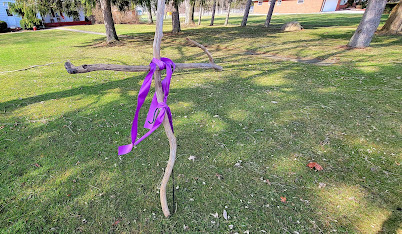(Cross, on our front yard)
Fleming Rutledge writes:
The important thing [in Galatians 3:10-14] here is Paul’s announcement (kerygma) that God, in the person of his sinless Son, put himself voluntarily and deliberately into the condition of greatest accursedness — on our behalf and in our place. This mind-crunching paradox lies at the heart of the Christian message.
Rutledge, The Crucifixion: Understanding the Death of Jesus Christ (p. 100)
What does Gal. 3:10-14 say? Here is J. Louis Martyn's translation.
Those whose identity is derived from observance of the Law
are under the power of a curse, because it stands written,
“Cursed is everyone who is not steadfast in observing all of the things
written in the book of the Law, so as to do them” [Deut. 27:26].
That before God no one is being rectified by the Law
is clear from the fact that “The one who is rectified by faith will live” [Hab. 2:4].
Moreover, the Law does not have its origin in faith;
if it did have its origin there, it would not say,
“The one who does the commandments will live by them” [Lev. 18:5].
Christ redeemed us from the Law’s curse,
becoming a curse in our behalf;
for it stands written,
“Cursed is everyone who is hanged on a tree” [Deut. 21:23b].
He did this in order that the blessing of Abraham
might come to the Gentiles in Jesus Christ;
in order, that is, that we might receive the promise,
which is the Spirit, through faith.
